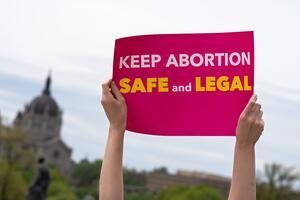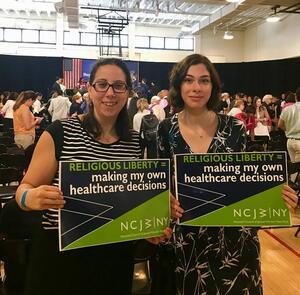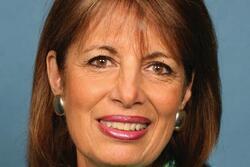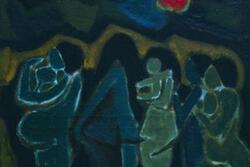Abortion Activism Brought Me Back to Judaism
In the United States, religion and abortion are often presented as oppositional. The Trump administration almost exclusively defines “religious freedom” as an excuse to deny people reproductive healthcare. Just a few weeks ago, the Department of Health and Human Services issued new “conscience” guidelines allowing healthcare workers to discriminate against people seeking birth control, abortion, and other forms of reproductive healthcare, all in the name of religious freedom. But in my case, advocating for abortion access has brought me closer to my faith.
Like many young Jewish people, I slowly drifted away from organized religion after my bat mitzvah. While I was proud of my Jewish heritage, I wasn’t particularly connected to religious observance, and soon, I started to feel quietly agnostic. Religion simply didn’t have any relevance to my life.
It wasn’t until my junior year of college, when I interned with the National Council of Jewish Women, that I began to reflect on the connections between my religion and my work. Through researching NCJW’s decades of activism for reproductive healthcare access, I began to learn about the long tradition of Jewish support for abortion access.
I wasn’t exactly well-versed in Jewish law and philosophy, so I was startled by how beautiful it was. A concept that particularly resonated with me was k’vod habriot, which literally means “the honor of being God’s creation,” but is also frequently translated as “individual dignity.” The unification of those concepts in one term deeply moved me. The language of “pro-choice” and “privacy rights” often portray legal abortion as a negative right: The government doesn’t have the right to interfere in a private decision. I had applied that same negative-rights framework to abortion access, telling myself that it didn’t matter what religious traditions had to say about abortion. It’s revolutionary and beautiful to say that the honor of being created by God includes the right to make moral decisions about your own future and body, and that these decisions are divinely affirmed. Reading about k’vod habriot didn’t just make me feel closer to my work. It also made me feel closer to God in a way I’d never felt before. Even now, it feels a little dorky and uncomfortable for me to talk about my faith, like I’m flexing an unused muscle.
I was also surprised to learn that Jewish law actively reaffirms principles of reproductive justice. Reproductive justice is a human rights movement developed by Black feminists in the 1990s. The movement goes beyond the reproductive rights movement’s limited focus on abortion alone, and asks us to look at the greater societal power dynamics that impact people’s ability to decide whether to have children and how to raise a family. Unlike reproductive rights, which mainly focus on the right not to have children, reproductive justice actively affirms people’s ability to have and raise their children. This principle is embodied in the biblical story of Shifrah and Puah, two ordinary Egyptian midwives who heroically defied Pharoah’s orders to kill Jewish babies.
I had an unexpected reaction to the story of Shifrah and Puah: I cried. Profusely. As much as I loved reading stories about women like Miriam, Deborah, and Esther, I always knew that ancient Judaism was heavily patriarchal, so I never felt all that connected to the Torah. Yet the story of these midwives centered the leadership of two everyday women who were, for their time, reproductive healthcare providers! When I reflect on the people I know in the reproductive justice movement, from abortion providers to doulas, from community organizers to abortion fund volunteers, I think about the sacred work of Shifrah and Puah, and I feel strengthened. I am lucky to belong to a community of advocates that would have resisted Pharaoh thousands of years ago, and continues to resist unjust laws today.
Now more than ever, we need to do the sacred work of protecting and expanding people’s reproductive healthcare access. Though the bills have not yet gone into effect and will certainly be blocked in the courts, Alabama, Georgia, and Missouri recently passed draconian abortion bans into law. These bills are meant to set up a Supreme Court case gutting abortion access (even without formally overturning Roe v. Wade). This legislation would disproportionately hurt low income people and people of color for a couple of reasons.
First, people would have to travel to another state to access abortion, which is already a prohibitively expensive procedure for many. As Oriaku Njoku, cofounder and director of ARC-Southeast, explained in a recent interview, many people “have actually been living this post-Roe reality” due to existing barriers to abortion access. Second, these bills contain “personhood” language that has been disproportionately used against-low income people of color to criminalize miscarriage and abortion. Defining fetuses as legal persons will actually lead to greater legal punishments for abortion than existed before Roe, incarcerating people for their pregnancy outcomes.
Supporting abortion funds, which provide direct funding for abortion expenses, is the best way to get involved. As a former volunteer for an abortion fund, I can tell you that every dollar is critically important. Nothing made my stomach drop more than seeing a list of callers and knowing I’d have to call them back to tell them all that we’d already hit our weekly budget. The National Network of Abortion Funds can connect you to your local fund. Please don’t try to reinvent the wheel: Get tapped into your community and give what you can, whether it’s a few dollars or a few hours of your time. I also want to emphasize that reproductive justice is a movement created and led by people of color, and any advocacy work for abortion access should center their voices. I once wrote that white Jewish women need to make the same promise to Black women that Ruth made to Naomi: “Where you go, I will follow you.”
Advocating for abortion access and reproductive justice can be emotionally exhausting. Reading the news, it’s easy to feel hopeless. But I’ve taken strength from my faith and a community of activists who inspire me to stay fighting. I hope that, by getting involved in activism for abortion access, other people can find connections to their faith and to modern day Shifrahs and Puahs who are leading the fight for reproductive justice.









This is so cool. It's so important to dork out and let what you're passionate about and dedicated to meld with your intellectual prowess the way you've presented it here for us. Thank you for this great read- it makes me realize I've got a lot more to learn about intersections in my own identity
An important read! Thank you. I fundraised for Planned Parenthood on Facebook and got a lot more than what I would be able to give: 650.00.
Great article! Thank you for writing this.
Great article, Nina!